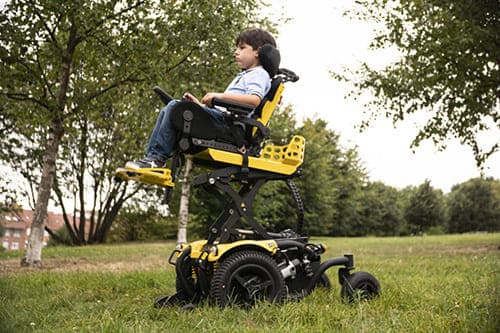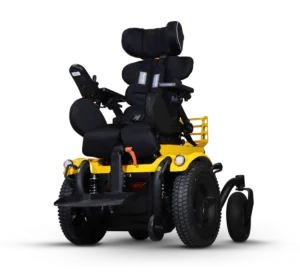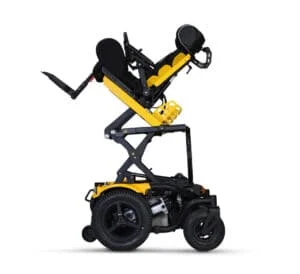Firstly, there is no best wheelchair, only one that best fits the user. For that reason, the existing power wheelchairs for children available on the market are very diverse. The common attributes of pediatric power wheelchairs include the ability to accommodate growth, flexible drive controls, and the ability for transportation requirements (Seating and Wheeled Mobility, 2018). The best choice for each child will depend on their specific medical or mobility needs.
1. Indoor vs. outdoor wheelchair:
The first thing to consider is where the user plans to use the mobility device and their mobility requirements? If your child will be using it mostly indoors, you should probably consider a smaller turning radius (mid-wheel drive is recommended), a narrower total width, and the shorter total length. But if your child will be using it mostly outdoors, you have to consider the travelling range, suspension system for comfort, and the ability to overcome obstacles (front-wheel drive is recommended).

Karma’s Kameleon is a front-wheel drive power wheelchair, suitable for outdoor and indoor use.
Read more about the different wheel configurations [Which Driving Wheel Configuration Should You Choose?]
2. Transportation needs:
Besides the portability and transportation of the power wheelchair, there is another factor to consider. If you can’t afford an accessible van or you have difficulty going on public transport, you might need a chair that can be easily folded or disassembled into several lightweight pieces for easy transport.
If not this is not an issue, choose a power wheelchair that has passed the strict crash test for maximal safety. What does it mean when a wheelchair has been crash test approved? It means that it is suitable to be used as a seat in a motor vehicle for transportation.

Karma wheelchairs are crash tested in accordance with ISO 7176-19 to ensure that are suitable to be used as a seat in a motor vehicle.
3. Growth and positioning needs:
Choosing a seating system with growth adjustability and a support system is a must. The adjustability of the seating system is extremely important since the body dimensions and needs of the child will constantly change when growing up. The postural supports are also essential to maintain trunk and pelvic alignment and prevent body asymmetries in alignment. We have to be aware that children may have difficulty learning if they don’t have the ability to sit in an upright, stable, and comfortable posture and interact with their surroundings to experience independent mobility (Seating and Wheeled Mobility, 2018).
4. Power function choices:
Another consideration when choosing powered mobility is the power seat functions, which include tilt, recline, seat elevation, and powered standing. RESNA recommends the utilization of power seat functions as they provide several physical benefits, improve functional activities, and also numerous psychosocial and quality of life benefits (RESNA, 2015).
Featured Products:
Sneak peek at Kameleon before our official launch. Approx. 2021 Q4

Ken Chen, PT, MS, ATP
Global Product Training and Development Manager
Ken has 10 years of experience as a physical therapist in the area of wheelchair seating/mobility. Ken took on the role of Product Manager for Karma in 2012 and was responsible for the research on user needs and market trends for product development. In 2015, Ken got certified Assistive Technology Professional (ATP) accredited from RESNA.
In 2018, Ken was transferred to the sales department in Taiwan to provide custom products and services for disabled users. He has provided a variety of continuing education courses and lectures in the area of seating/mobility for Taiwanese therapists.
In 2020, Ken was appointed as Product Educator in Karma Group. Now he provides a variety of product training and clinical education courses to the global dealers, distributors, and therapists with Karma’s clinical consultant Pau-Lee.

 Global
Global
